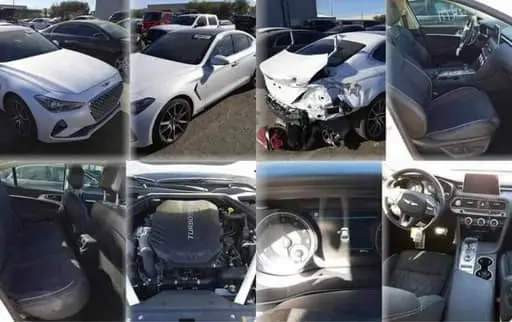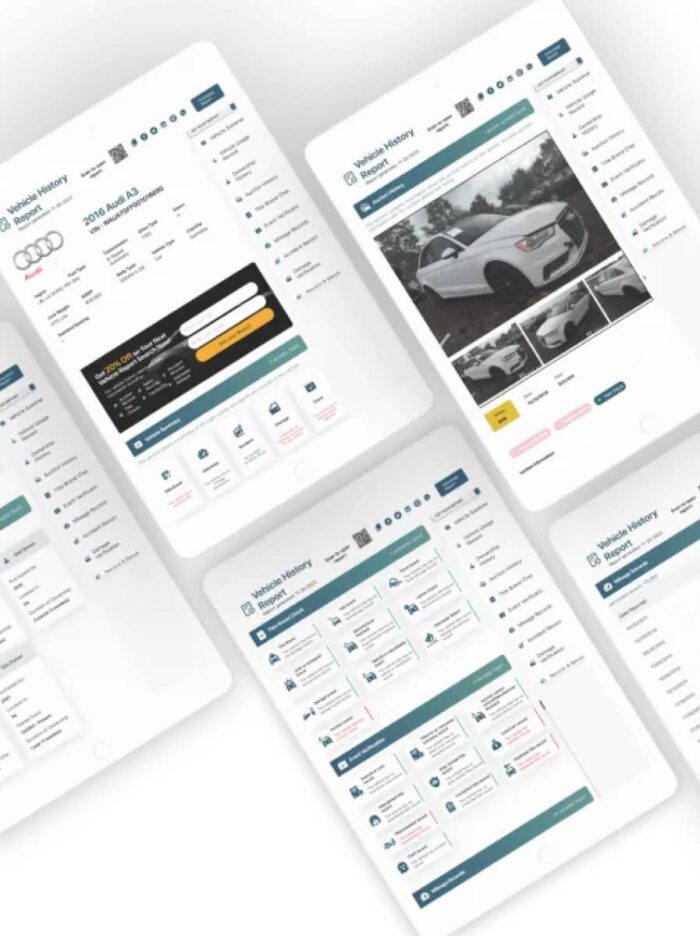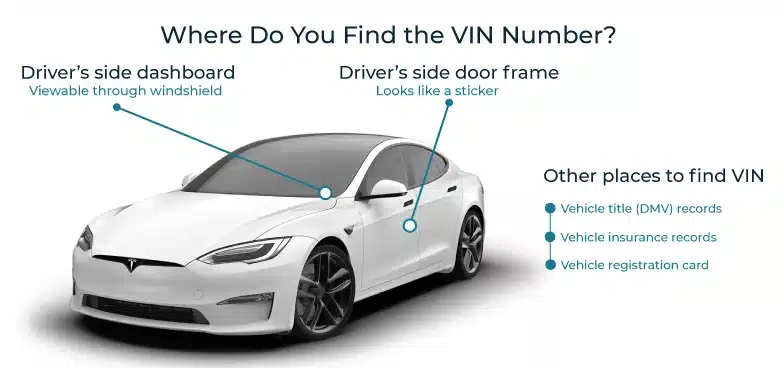Texas VIN Check
A Texas VIN check gives car buyers and sellers an opportunity to accurately assess a vehicle’s reliability and view hidden defects before purchase. Get a full report and access records of past accidents, title brands, flood damage, ownership, services, and more.


- The vehicle had multiple lien and loan records.
- Accident history with substantial damage.
- Salvage title, auction records, and mileage discrepancy.
What Texas VIN Check Mean to Car Buyers & Sellers?
A Texas VIN check is essential for car buyers and sellers because the state faces serious vehicle risks. In 2023 alone, 115,013 vehicles were stolen, the second highest in the nation. Texas also tops the country for flood-damaged cars, with about 64,000 on the road, making it vital to confirm a vehicle’s true condition before purchase.
Beyond theft and flood damage, Texas drivers face recall and odometer concerns. Over 6 million vehicles carried open recalls in 2025, with 1.6 million having two or more unresolved. The state also ranked second for odometer rollbacks, with about 294,200 cases in 2024. Running a Texas VIN check helps reveal these risks, along with accidents, liens, title brands, and ownership, ensuring transparency and safer transactions.
Where is the VIN Number Located?
A VIN is a special code that’s unique to every vehicle. It’s usually 17 characters long and can be found in the following places:
- Dashboard: You can see the VIN on a label at the corner of the dashboard on the driver’s side, visible through the windshield.
- Driver’s Door Frame: Check the sticker on the driver’s side door frame; it shows the VIN number and other car details.
- Car Registration: Your vehicle registration papers list the VIN number along with other information.
- Insurance Papers: Insurance documents also include the VIN.
- Owner’s Manual: The owner’s manual often shows the VIN along with other details.
Why Perform VIN Lookup in Texas Before Buying a Vehicle?
Running a Texas VIN check helps reveal important details about ownership changes and incidents affecting value or safety, such as accidents, flood damage, and odometer discrepancies. Here are additional reasons to check a vehicle’s history:
Verify Title History
A VIN lookup in Texas identifies title brand records showing all types of car titles and identifies whether a vehicle has a clean title or is branded as salvage, rebuilt, or lemon. With a title check by VIN, you can steer clear of vehicles with hidden problems that could affect their value and safety.
Accident History
A Texas VIN check also provides insights into past accident records, directly showing how reliable a vehicle would be. It highlights the damage types and severity, giving an idea of potential safety risks and maintenance needs.
Verify Mileage and Odometer History
A VIN check in Texas helps detect mileage discrepancies, revealing if sellers have tampered with odometer readings to make the vehicle appear younger. A car mileage check helps verify a vehicle’s actual condition and ensures you know the true mileage before purchasing.

Lookup Recall History
In Texas, over 1.6 million vehicles had two or more unfixed recalls in February 2025. Finding out if a vehicle has unresolved issues can help you identify and fix safety issues before purchasing. Getting a VIN check in Texas ensures you don’t end up with a car with safety and reliability issues.
Confirm Ownership History
A VIN lookup in Texas shows just how many times a vehicle has been owned in the past, the duration of ownership, and location. If the vehicle has had several owners within a short period, it’s a sign that there may be an underlying issue. You can also spot stolen vehicles by checking the ownership history.
Theft Check
A Texas VIN check can confirm if a vehicle has been reported stolen or is part of an insurance theft claim. This information is important for avoiding legal issues and ensuring the vehicle is legitimate.
Flood, Hail, and Fire Damage
Natural disasters can severely affect a vehicle’s performance and safety. A Texas VIN check will inform you if the vehicle has been in incidents such as flooding, hailstorms, or fires. If they’ve been, you can plan towards avoiding these cars and the hidden structural issues or long-term effects from such events.
Lien and Loan Check
A lien check by VIN protects you from inheriting a vehicle with outstanding debts. The quick check confirms whether the vehicle has any unpaid loans or legal claims against it, ensuring you won’t inherit financial responsibilities and safeguarding your investment in the long run.
Lookup Classic Car History by VIN in Texas
Checking the short classic car VIN numbers can be difficult, but our tool makes it easy. Whether the VIN is between 5 and 14 digits or the car was manufactured before 1980, you can find out details like year, make, model, engine, transmission, and more.
You’ll also see the car’s history, including past owners, mileage records, auction records, and even photos if available. Our classic car VIN lookup tool gives you the right information to buy a vintage car with confidence in Texas.
How a Buyer Avoided a Car with Accident Records in Texas
This study shows how a used car buyer avoided buying an accidented car unknowingly by checking the car history report.
Sample VIN: 1C4BJWEG9FL564784
Seller’s Overview
- The car was Ready for the road.
- Enticing photos, with clean interiors.
- Fair price.
Key Findings
- 1 accident record
- 4 lien/loan records
- 1 damage record
- 1 auction history and images
- Odometer rollback
- Salvage title
Decision and Outcome
- The buyer abandoned the deal.
- Not ready to buy an accidented car.
Lesson Learnt
- A clean car can still hide issues.
- Never rely on the seller’s claim only.
TX Laws Related to VIN Checks
If you’re buying a vehicle in Texas, you need to understand the legal framework surrounding VIN checks. This ensures you remain compliant and makes for a smooth car-buying process. Here’s everything you need to know:
Title Transfers in TX
In Texas, you must transfer a vehicle title within 30 days of sale to avoid liability for any tickets or violations. Here are key steps to ensure a smooth transfer:
- Accompany the Buyer: Sellers should go with buyers to the county tax office to ensure proper completion of the title application.
- File a Vehicle Transfer Notification: If selling to a licensed dealer, file this notification within 30 days to update the vehicle record and protect yourself from future liabilities.
- Required Documentation: When buying from an individual, obtain:
- The signed vehicle title.
- Application for Texas Title and/or Registration (Form 130-U).
- Any necessary supporting documents (e.g., release of lien, power of attorney).
For more detailed information on title transfers, visit TxDMV Title Transfers.
Insurance Registrations
In Texas, the VIN is vital for determining vehicle insurance premiums. Insurers use it to review a vehicle’s history, including accidents and theft reports. A clean history leads to lower premiums, while vehicles with past issues may face higher rates. The average annual premium in Texas is around $2,500, but this varies based on the vehicle’s history and the insurance provider.
VIN Replacements in TX
In certain situations, it may be necessary to replace a vehicle’s VIN. This can occur due to:
- Damage or Alteration: If the original VIN plate is damaged or altered beyond recognition, a replacement may be required.
- Restoration Projects: Vehicles that have undergone extensive restoration might need a new VIN assigned to accurately reflect their current state.
To learn more about the process for VIN replacements in Texas, refer to the VIN Assignment Process.
Vehicle Requirements for Commercial Purposes in TX
If you plan to use a vehicle for commercial purposes in Texas, it must meet specific requirements regarding gross weight.
- Gross Weight Limits: Commercial vehicles must adhere to state regulations concerning weight limits. Vehicles exceeding these limits require special permits. For detailed information on size and weight requirements for commercial vehicles, visit Texas Size & Weight Limits.

Why Choose Detailed Vehicle History for Texas VIN Checks?
When you run a VIN check in Texas with Detailed Vehicle History, you get a full report with over 200 data points about the car. This includes specifications, sales records, and auction records with photos, mileage, theft and accident history, ownership records, market value, liens, salvage status, classic VIN decoding, and more.
Our aim is to help buyers and sellers stay safe by giving them the right information to make smart choices. A quick VIN check can help you find a reliable used car at the right price.
Useful Resources for Car Buyers in TX
If you’re looking to register or check vehicle information in New Jersey, the following resources can be extremely helpful:
Customers Testimonials
Richard Langridge was the rep that helped me. He was great He helped me get the report I was seeking right away. I had tried several other websites claiming to be able to provide the info I wanted and none of them succeeded. Richard was courteous and patient and walked me through the process from beginning to end. Good job Richard. Thank you.
LB Tag
I am in the market for a used car but the seller does not have any of the original information from the dealership. I went onto Detailed Vehicle History’s website and did a live chat with Richard. He answered all of my questions and made the process incredibly easy to get all of the information needed about the car.
G G
I had a strange request… Desperately trying to find info on a 1964 Cadillac I was buying. Kicker is it comes with no title and only had a 9-digit number stamped on the frame. NO OTHER sites I went to could recognize anything less than 17 digits. However, DVH was able to …Read More
Justin Martens
Run VIN Check in Other States
- Alaska
- Alabama
- Arizona
- Arkansas
- California
- Colorado
- Connecticut
- Delaware
- Florida
- Georgia
- Hawaii
- Idaho
- Illinois
- Indiana
- Iowa
- Kansas
- Kentucky
- Louisiana
- Maine
- Maryland
- Massachusetts
- Michigan
- Minnesota
- Mississippi
- Missouri
- Montana
- Nebraska
- Nevada
- New Hampshire
- New Jersey
- New Mexico
- New York
- North Dakota
- North Carolina
- Ohio
- Oklahoma
- Oregon
- Pennsylvania
- Rhode Island
- South Carolina
- South Dakota
- Tennessee
- Texas
- Utah
- Vermont
- Virginia
- Washington
- West Virginia
- Wisconsin
- Wyoming
Frequently Asked Questions About Texas VIN Check
How to check a VIN number in Texas for free?
You can use our free VIN check in Texas to get basic specifications. However, the free version may not provide complete information; consider obtaining a full vehicle history report for thorough insights using our Texas VIN check tool. Verify records like accidents, liens, title brands, auctions, ownership, theft, and more.
How to do a VIN check in Texas?
Use our Texas VIN check tool to lookup any vehicle history in seconds. This provides access to the detailed records like usage, ownership, accidents, thefts, liens, and more.
How to check if a car is stolen in Texas?
To check if a vehicle is stolen in Texas, simply run a Texas VIN check using our tool. It will show if there were any records of theft, and if the vehicle was recovered. You will also access other details like accident records, mileage history, recall information, service records, and more.
What is a Texas DMV VIN check?
A Texas DMV VIN check lets you see a car’s title and history records. By searching the National Motor Vehicle Title Information System (NMVTIS), you can confirm if the vehicle is salvaged, flood-damaged, stolen, or has other issues.
Can a Texas VIN check reveal if a vehicle has been involved in a flood, hurricane, hail, or fire?
Absolutely. A Texas VIN check can show if a vehicle has been declared a total loss due to natural disasters like hurricanes or flooding, which are common in the state. This helps prevent buying a car with extensive hidden damage.


